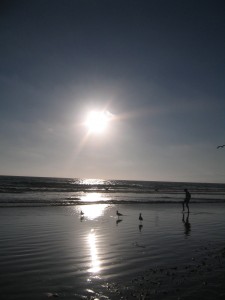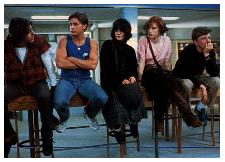News

Under Construction – Please Watch Your Head
0Hi all – there will be some repairs going on here at EstherK.com. Hopefully, this won’t interfere with posting, but just wanted to give you the heads up about the impending scaffolding. 🙂

Casting Call – The Rite of Tashlich (Jewish Journal)
0 Casting Call: A Tashlich Meditation
Casting Call: A Tashlich Meditation
(The Jewish Journal, September 8, 2010)
My shoes slip off, my feet sink into soft sand and then approach the sea, where they submerge and are washed. But even freshly emerged from water, they remind me that just because you’ve washed something doesn’t mean it’s truly clean.
Rosh Hashanah marks the world’s birth — a new year, a new circle of Jewish holidays about to begin. The 10 days of repentance, which create the structure for apologies to self, neighbor and to God. Tashlich, the ritual in which bread is cast as sin and then cast out of us and into the water, is part of the preparation for Yom Kippur. It is Tashlich, this opportunity to make physical the act of rejecting iniquity, that draws me to the edge of the Pacific Ocean, steps away from the frivolity and fun of the Santa Monica Pier.
To read the rest of the article, click here.
Wishing all my friends and readers a wonderful new Jewish year.

Your “Twimprimatur,” and Other Secrets of Social Media
0 What’s a Twimprimatur? Here’s a hint: I made it up. And here’s another hint: imprimatur + Twitter. (Imprimatur literally means “let it be printed,” but here are some more definitions.)
What’s a Twimprimatur? Here’s a hint: I made it up. And here’s another hint: imprimatur + Twitter. (Imprimatur literally means “let it be printed,” but here are some more definitions.)
In July, I was interviewed by Rusty Mike Radio in Jerusalem – we went deep into blogging, Twitter, Facebook, and more. Check out the entire interview here, for insights into making these social media work better for you, as well as stories about Jewish innovation, how to make blogging into a quasi-career, and what my connection is to Madonna. And, of course, how to create your own Twimprimatur. 🙂
Jewish Blogging 101 and 201 Now Online
0I recently concluded a three-part webinar series on social media and blogging for the Jewish Communal Professionals of Southern California. My presentations from those webinars are now available online. See the “Social Media Basics” webinar here.
Newly uploaded on Slideshare is “Jewish Blogging 101” and “Jewish Blogging 201,” both below.
Esther’s Sessions at LimmudLA – Including Dates and Times
0Join me for my sessions at this weekend’s LimmudLA conference….
The Innovation Ecosystem: A 21st Century Organic Jewish Community
Joshua Avedon, Yoni Gordis, Esther Kustanowitz, Naomi Less, Scott Perlo
Saturday 12:30 PM–1:45 PM
Identity and Responsibility, Teen Approved
Over the past decade or so, the Jewish world has witnessed the emergence of a new landscape of innovative startups. These enterprises have created new entry points to Jewish life, and new ways of building Jewish community. This diverse and vibrant collective of new Jewish initiatives is evolving into an organic communal infrastructure for the Jewish community in the 21st century. This session is a tour though the diverse and vibrant ecosystem driving Jewish innovation across the globe. Meet some of the innovators and find out how their work is changing the Jewish world.
Jews’ Line Is It Anyway?
Saturday 2:00 PM–3:15 PM
Arts and Performance, Teen Approved
What’s so Jewish about basic improv comedy? This informal, participatory workshop introduces the basics of both improv comedy and Jewish community to Jews and Judeophiles of all ages.
Finding Your Inner Megillah
Monday 11:30 AM–12:45 PM
Identity and Responsibility, Teen Approved
There’s a megillah inside every Jew, not just those named Ruth and Esther. Jews are natural storytellers because our faith is based in oral and then written history. But what makes a story worth telling and retelling, generation after generation? In this experimental writing workshop, visit some noteworthy texts from Jewish tradition and engage in free-writing exercises based on and inspired by those texts.
Hope to see you there…
Upcoming Events: 2010
02010 is right around the corner, and I’m booking gigs in at least four cities. Be in touch to discuss ways in which I can help you improve your relationship with social media and creative content in 2010…
January 21 – invitation-only Skills Building Workshop: Best Practices in Social Media (Los Angeles)
February 12-15 – Presenter, LimmudLA (Los Angeles) – register now – “Writing Your Inner Megillah” (writing class), and “Jews’ Line Is It Anyway?” (basic improv from a Jewish perspective)
March – TBA – (Los Angeles, and a probable visit to San Francisco) / Bay Area
April – TBA – NYC
June – TBA – Jerusalem
July – ROI Summit – Kfar Maccabiah (near Tel Aviv)
August – TBA – Los Angeles
Stay tuned for more events as they’re confirmed. And don’t hesitate to contact me if you have questions about my appearing in a city near you!

Celebrity Obituaries: John Hughes, Patrick Swayze
0 Over the past few months, pop culturistas like me lost pieces of our cultural childhoods one at a time, each one adding to the devastation: no sooner were we moving past Farrah Fawcett and Michael Jackson, that we lost writer/director John Hughes and dancer/actor/not putting Baby in a cornerer Patrick Swayze. Hughes and Swayze, were two linchpins of my cultural adolescence, sculpting the landscape of expectation for me and countless others in my generation, as we moved forward into an uncertain future.
Over the past few months, pop culturistas like me lost pieces of our cultural childhoods one at a time, each one adding to the devastation: no sooner were we moving past Farrah Fawcett and Michael Jackson, that we lost writer/director John Hughes and dancer/actor/not putting Baby in a cornerer Patrick Swayze. Hughes and Swayze, were two linchpins of my cultural adolescence, sculpting the landscape of expectation for me and countless others in my generation, as we moved forward into an uncertain future.
John Hughes went first, in August, and I thought in movie quotes for days. “Demented and sad, but social.” “Anyone? Anyone? Bueller?” And of course, every single line from my beloved mantra of a movie, “Sixteen Candles.” (“Jake Ryan? But he’s a senior, and he’s taken…I mean, REALLY taken.”) But I felt I had to write about him: this post at Beliefnet’s Idol Chatter is the result.
Then we lost Swayze, and I didn’t have the energy to plumb my own depths for reactions: instead, I went to social media, relying on Facebook status updates and Twitter messages to express the collective sense of mourning.
These pieces were sad to write, but as a writer, I appreciate the opportunity to mourn with thousands of others, virtually, through words, over the internet, because together, we are a community of the affected – in our union over a career’s end, we celebrate the work of the artists and their undeniable impact.
Esther’s Limmud LA Sessions
0LimmudLA, an annual post-denominational, multi-generational conference exploring all facets of Jewish life and identity in which everyone has something to learn, and everyone has something to teach is being held February 13-16 in Costa Mesa, CA, and I’m involved with four sessions…times and room assignments will be revealed on site, so if you’re going, make sure to look for me on the schedule and running around the conference.
Reshaping the Jewish Future: A Look at Young Jewish Innovation Worldwide
Jewish demography studies have focused on the dwindling birth rate. But beyond the numbers panic, Jewish innovation and creativity has seen unprecedented growth as a cohort of young Jews are changing the Jewish future through creative programs. Join representatives of the ROI Community (a global network of Jewish leaders in their 20s and 30s) for a discussion about community partnership with these new initiatives and a glimpse into how globalization may affect the Jewish people.
The Singles Scene: Jewish Dating in the Age of J-Date
Scott Perlo, Esther Kustanowitz, Suzannah Warlick
It has been said that all is fair in love and war, but is everything really fair in the pursuit of love? What are the “sins” of modern dating and matchmaking? How does the Internet affect how we connect with (and sometimes disparage) each other? What do Bible stories teach us about relationships? And how can we as Jews apply our ethical code and tradition to the process of matching ourselves and others? Our panelists explore ethical dating in the modern age.
‘Jews’ Line is it Anyway?: Basic Improv for Jews
Let’s face it: we may be the people of the Book, but our history, while widely documented after the fact, is not pre-scripted. As a people, Jews have always improvised in daily life and our adaptability, intelligence and humor have helped us become an active part of comedy and popular culture. Join other beginning improvisers for basic improv icebreakers and some light cultural analysis of what makes these short-form improv games “Jewish.”
Writing Workshop: Find Your Megillah
There’s a megillah inside every Jew, not just those named Ruth and Esther. Jews are natural storytellers because our faith is based in oral and then written history. But what makes a story worth telling and retelling, generation after generation? In this experimental writing workshop, visit some noteworthy texts from Jewish tradition and engage in free-writing exercises based on and inspired by those texts.
Last Jewish Week Singles Column: “Know When to Walk Away”
1I wrote the thing weeks ago, but then found myself in Tmol Shilshom, a Jerusalem restaurant where the theme is books. Surrounded by the works of famous Hebrew and English authors, I finished the final column. I usually don’t reprint the entire thing on my blog, but it will be the last time, so I wanted to share.
-
(And yes, columns are still available for reprint.)
Thanks to everyone for their support for the column over the last four and a half years, as well as your commitment to this ongoing conversation.
“Know When to Walk Away”
by Esther D. Kustanowitz
How does one become a Jewish singles columnist, anyway? On recent reflection, it has occurred to me that perhaps I’ve only found myself here, an untrained sociologist Jane Goodall-ing it in the singles jungle, because of the metaphorical significance and transformative power of transit.
Several years ago, during a work trip to Israel, I had been picked up at the airport by a taxi and was traveling to Jerusalem when the driver began making Hebrew conversation. It started innocently, with a “welcome to Israel” and “what are you doing here?” and ended in a question I didn’t quite understand. “At revakah?” he asked. “Revakah?” I asked. “Revakah zeh lo nesuah (‘revakah’ means ‘not married’).”
I had never heard the word before. Most of my Hebrew was biblical, and most unmarried biblical women were referred to as betulah, which most English Bibles translate as “virgin.” Where, linguistically, could “revakah” have come from? I tried to “shoresh it out,” parsing the word and looking for a root. Since it was unlikely that the resh-vav-kuf could be read as “rock,” the best logical word origin I could find was the word reyk, meaning empty. If Genesis was right and it was “not good for a person to be alone,” then was it a huge leap to identify a person who hadn’t found their soul mate as, to an extent, empty? The Hebrew language seemed to think not. In that moment, an idea began its path of transit.
More recently, I was on a bus, spiraling down the West Coast. The sea was out of sight, and clouds sagged low over the mountains, which rolled past the windows as if they were on a conveyor belt, and I was the one who was standing still. I knew it was an illusion; the bus moved, and the scenery passed, but instead of feeling like an active participant in our progress, I felt detached and stagnant. Noticing the vast expanse of Northern California land, I felt the solitude descend, a curtain closing on a dramatic chapter.
At the end of that trip down the coast, I found myself thinking about journeys, the constant wandering of being in transit, and — because I was headed to Las Vegas — the song lyric that urged me to “know when to hold ‘em, know when to fold ‘em.” I knew I wasn’t quite at “know when to run,” but “know when to walk away” began to resonate strongly. I don’t like leaving my destiny to chance — heading off into the great unknown has never been an area of comfort for me. But it became clear that any more hands of solitaire or broken gambling metaphors, and I would risk the erosion of the parts of me that I’m most proud of, precisely the ones I’d hoped to one day share with a family.
My four years writing this column seem commensurate to an academic degree in relationships, yet somehow I’m ABD, and without the coveted “M.R.S.” degree. Perhaps I need to concentrate on field work, move beyond the theoretical into the actual. This column has been the longest relationship of my life. But I can’t marry a column. The transition will be one of the hardest things I’ve had to do, but I think that it’s time.
I don’t know what is or isn’t in the cards for me. If God is calling the shots, I’d like to believe that the Deity wants me to be happier than I am, if only selfishly, for the strengthening of my faith weakened by staying single. I’d still like to be able to contribute to the expansion of the nuclear family I’m already so blessed to have. Or perhaps I’m committing hubris — an English major’s favorite sin — by thinking that I’m on God’s agenda at all. I’m aware that my life has been a series of unique opportunities that have been both humbling and a blessing. It may make me selfish, but I’d still hoped to have more.
There has to be more than just the illusion of progress. It’s a gamble, but every change is. It’s time to put one foot in front of the other, fix my eyes on the future, and walk away from what’s comfortable, into what might, one day, be possible. I’m in transit again. Let the chips fall where they may. And next time an Israeli taxi driver asks me to define my status, whatever it is, I intend to celebrate it.
Esther D. Kustanowitz thanks her editors, readers, family and friends for their support of this column and her obsession with Hebrew. In her “retirement,” she will be working on her book about living Jewish and single, and will continue to blog at MyUrbanKvetch.com and JDatersAnonymous.com, among other places. You can always reach her at jdatersanonymous@gmail.com.

